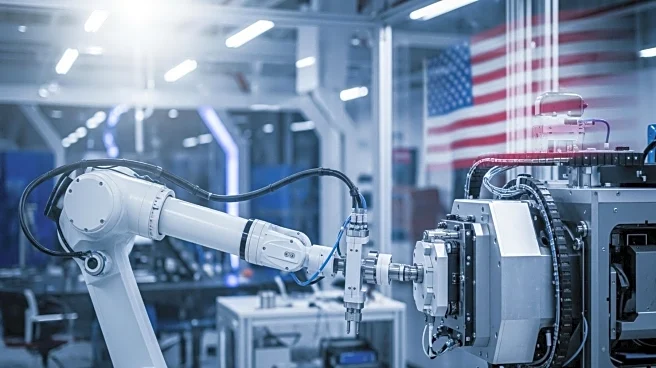What's Happening?
President Donald Trump has articulated a strategy aimed at revitalizing American manufacturing by leveraging foreign expertise. In a recent statement, Trump emphasized the importance of foreign companies bringing their knowledge and skills to the United States to train American workers. This approach is part of a broader policy to ensure that foreign investment contributes positively to the U.S. economy. The President's comments follow a federal immigration enforcement operation at a foreign-owned battery plant in Georgia, which led to the detention of hundreds of workers, many of whom were South Korean citizens. This incident has raised concerns about the potential impact on foreign investment, particularly from South Korea. Trump seeks to address these concerns by encouraging foreign companies to invest in the U.S. while ensuring that their presence includes a plan for knowledge transfer to American workers.
Why It's Important?
The strategy outlined by President Trump is significant as it aims to bolster the U.S. manufacturing sector, which has seen a decline in industries such as shipbuilding. By encouraging foreign companies to train American workers, the administration hopes to enhance the skills of the domestic workforce and reduce reliance on foreign expertise in the long term. This policy could potentially lead to increased job opportunities for American workers and strengthen the U.S. economy. However, the recent immigration enforcement action in Georgia highlights the delicate balance between attracting foreign investment and maintaining stringent immigration policies. The outcome of this strategy could have far-reaching implications for U.S. trade relations and economic growth.
What's Next?
The administration is likely to continue refining its approach to foreign investment, balancing the need for foreign expertise with the 'America First' principle. This may involve further diplomatic discussions with countries like South Korea to address concerns about the U.S. visa system and its impact on skilled foreign workers. Additionally, the U.S. government may implement policies to facilitate smoother transitions for foreign companies setting up operations in the country, ensuring that their investments include clear plans for workforce development. The response from foreign governments and companies will be crucial in determining the success of this initiative.









